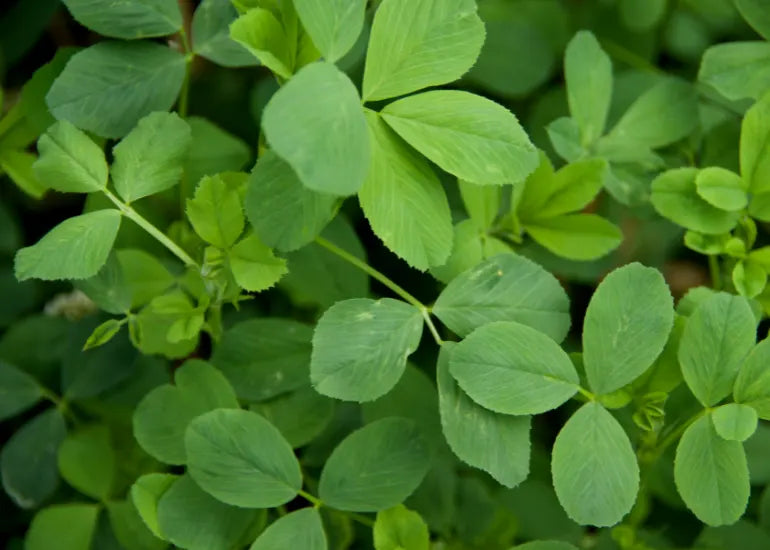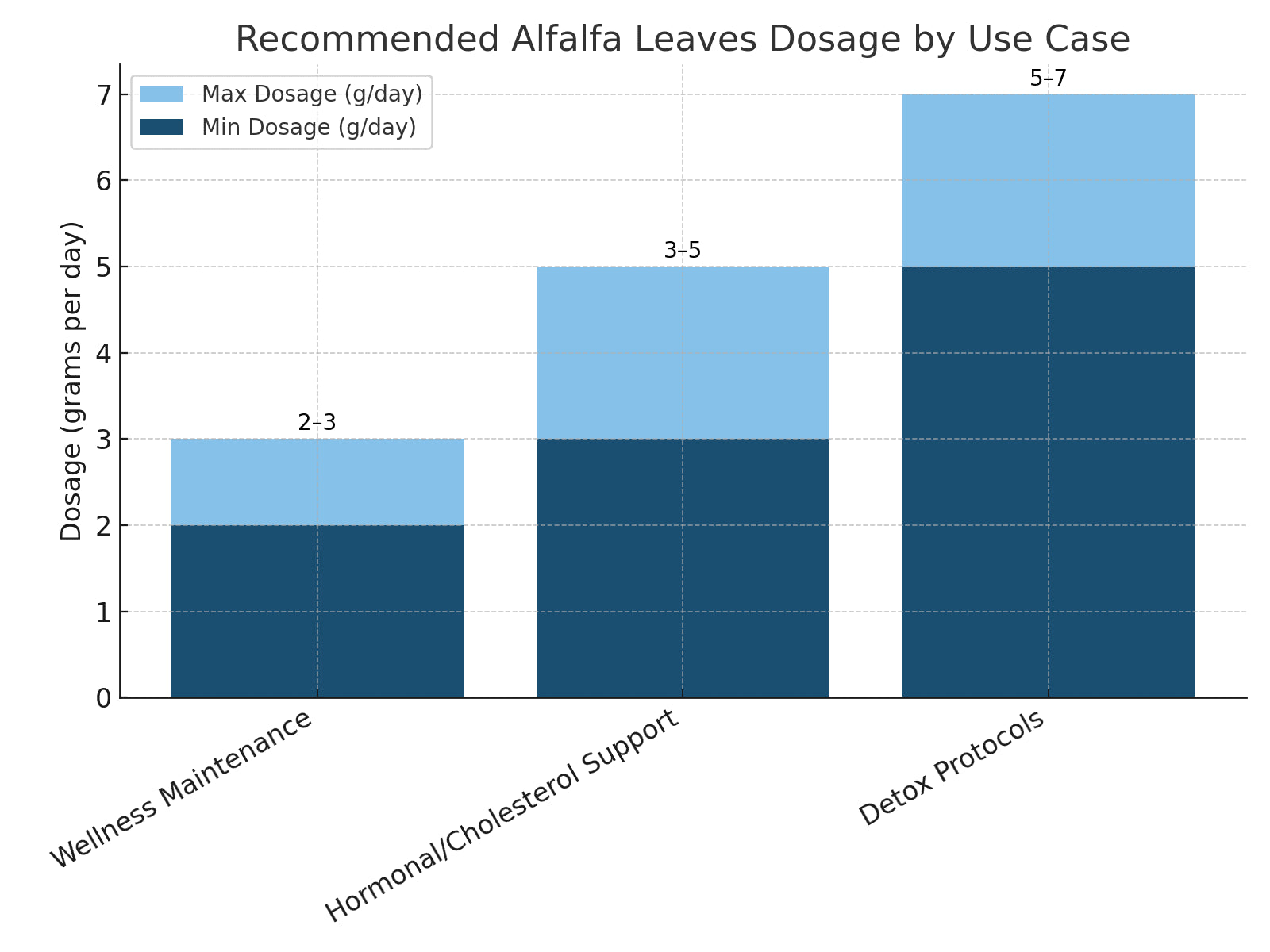
Alfalfa, scientifically known as Medicago sativa, is a perennial flowering plant from the legume family, traditionally used as livestock fodder but increasingly recognized as a powerhouse of nutrition for human health. Native to South and Central Asia, alfalfa has been cultivated for over 2,000 years, with its name derived from the Arabic phrase "al-fac-facah" meaning "father of all foods"; a nod to its dense nutrient profile.
The leaves of the alfalfa plant are harvested when they are vibrant green and young. They're sun-dried or low-heat dehydrated to retain their rich content of chlorophyll, vitamins, minerals, and antioxidants. Today, alfalfa leaves are commonly used in powdered or capsule form as a green supplement, or steeped as a tea for wellness and detox support.
In ancient Persia and China, alfalfa was used to relieve digestive distress and promote vitality. Ayurvedic and traditional Chinese medicine also prescribed alfalfa for supporting kidney health, aiding in urinary flow, enhancing nutrient absorption
Over time, Western herbalists began using alfalfa for its potential to support bone strength, balance hormones, and improve cholesterol levels benefits that are now being validated by modern science.
Alfalfa leaves are a concentrated source of plant-based nutrients, including:
Miduty's alfalfa is cultivated on certified organic farms with rich, uncontaminated soil. Compared to market alternatives that often use conventionally grown alfalfa, this approach ensures higher vitamin, mineral, and chlorophyll content.
Rather than using high-heat drying which destroys sensitive compounds Miduty employs cold-processing methods that protect enzymes, chlorophyll, phytoestrogens, and vitamins. Most standard brands, in contrast, lose significant nutritional value during processing.
Market supplements often lack clarity on active saponin content. Miduty's formula delivers a clinically relevant dose, ensuring well-supported benefits like cholesterol reduction and blood sugar support.
Miduty's green blend is free from fillers, binders, preservatives, artificial flavors, or colors. Many other brands compromise on ingredient integrity opting for cheaper fillers that dilute nutritional potency.
Unlike lone alfalfa powders found elsewhere, Miduty integrates its alfalfa into a supercharged blend with wheatgrass, spirulina, barley grass, moringa, probiotics, and enzyme-rich herbs. This synergy amplifies digestive support, detoxification, and immune resilience far beyond single-ingredient products.
Alfalfa is celebrated for its prebiotic fiber (fructo-oligosaccharides) and potent antioxidants, which foster healthy gut microbiota and reduce inflammation. Miduty's retention of these compounds exceeds what heat-processed powders can offer.
| Uses & Benefits | Description |
| As a Daily Green Superfood Supplement |
Alfalfa leaves are increasingly used in daily wellness routines as a natural alternative to synthetic multivitamins. A single serving can provide a robust supply of trace minerals, antioxidants, and energy-supporting nutrients. Its alkalizing and cleansing effects make it especially beneficial for people with acidic diets, high stress levels, or poor digestion. [1] |
| Hormonal and Menopausal Support |
Due to their phytoestrogen content, alfalfa leaves are often used to help balance hormone levels particularly during menopause or perimenopause. [2] These compounds mimic mild estrogenic effects, which can alleviate hot flashes and night sweats, support bone density, improve mood and sleep. Unlike synthetic hormone therapy, alfalfa offers a gentle, plant-based option with fewer risks. |
| Bone and Joint Health |
Due to its high calcium, magnesium, and vitamin K content, alfalfa supports bone remineralization, joint mobility, inflammation reduction. This makes it ideal for aging adults, postmenopausal women, or anyone dealing with stiffness or early signs of osteoporosis. |
| Cholesterol and Blood Sugar Management |
Alfalfa is rich in saponins, plant compounds shown to reduce LDL cholesterol and support healthy blood sugar levels. Studies suggest alfalfa leaf extract may lower total cholesterol, improve insulin sensitivity, reduce triglyceride buildup. [3] As a result, it’s often recommended in heart-healthy and diabetic-friendly diets. |
| Detoxifying and Alkalizing Properties |
Alfalfa leaves support liver and kidney detoxification by stimulating bile flow, binding toxins with fiber and chlorophyll, flushing uric acid and heavy metals. [4] Their natural alkalinity helps rebalance acidic blood chemistry, which can reduce inflammation, digestive distress, and risk of chronic disease. Regular consumption helps the body maintain homeostasis, especially in today’s acid-heavy diet culture. |
| Promotes Heart and Metabolic Health | Through a combination of saponins, antioxidants, and essential nutrients, alfalfa leaves lower bad cholesterol (LDL), support healthy blood pressure, improve circulation and endothelial function. This makes alfalfa an excellent supplement for long-term cardiovascular support. |
| Supports Digestive and Immune Function |
The natural enzymes in alfalfa help break down proteins and starches, relieving bloating, gas, and indigestion. Alfalfa is also a mild prebiotic, feeding beneficial gut bacteria and supporting immune health at its root. [5] When paired with other greens like wheatgrass or spirulina, alfalfa enhances digestive resilience and nutrient absorption. |

It's best to start slow and build up, particularly for those new to green supplements.
Alfalfa leaves are best consumed early in the day, ideally on an empty stomach or with a light meal to maximize absorption. Their high chlorophyll and enzyme content make them ideal for:
Taking alfalfa in the morning also supports liver and kidney detox pathways, aligning with your body's natural cleansing cycle.
On an empty stomach: Increases chlorophyll absorption and supports alkalizing effects. Taking it before meals may stimulate bile production and digestive enzymes.
When starting alfalfa, particularly at higher doses, some users may experience temporary detox symptoms such as mild headaches, digestive upset, fatigue or skin breakouts. These are common reactions when the body releases stored toxins and adjusts to new nutrients.
To minimize discomfort:
Symptoms typically subside within a few days.
While generally safe, alfalfa should be used cautiously by:
Alfalfa leaves are one of nature's most versatile and nutritionally dense greens. They offer gentle yet powerful support for Detoxification, Hormonal balance, Bone and cardiovascular health, Energy and digestion
They're a smart, sustainable addition to any wellness regimen from daily maintenance to therapeutic use.
Whether you're just starting your health journey or upgrading your supplement routine, Miduty's Alfalfa Leaves deliver unmatched quality, safety, and whole-body support.
Alfalfa isn’t the same as sprouts, but alfalfa sprouts are young shoots grown from its germinated seeds. Sprouts, in general, are immature plants from various seeds like beans or broccoli. Alfalfa sprouts are popular for their light, nutty flavor and crisp texture, harvested just a few days after germination.
In India, alfalfa is commonly known as Lucerne or Rijka. It is widely grown as a fodder crop for livestock but is also used in herbal medicine and health supplements.
Alfalfa is believed to aid detoxification by acting as a diuretic and supporting liver and kidney function in removing toxins. However, it should be used cautiously, as high doses or long-term use may be unsafe and could aggravate autoimmune conditions like lupus.
Alfalfa is usually safe in moderate amounts but may cause bloating, gas, or loose stools when overconsumed. It can also interact with medications like blood thinners and may worsen autoimmune conditions, so caution is advised for sensitive individuals.
Alfalfa should be avoided by pregnant or breastfeeding women, people with autoimmune disorders, hormone-sensitive cancers, gout, or weak immunity, as well as those on blood thinners. For others, the main risks include possible bacterial contamination in sprouts and interactions with certain medications.
| Sr. No. | Reference |
|---|---|
| 1. | Abscisic Acid Priming Creates Alkaline Tolerance in Alfalfa Seedlings (Medicago sativa L.) |
| 2. | |
| 3. | |
| 4. | |
| 5. |
